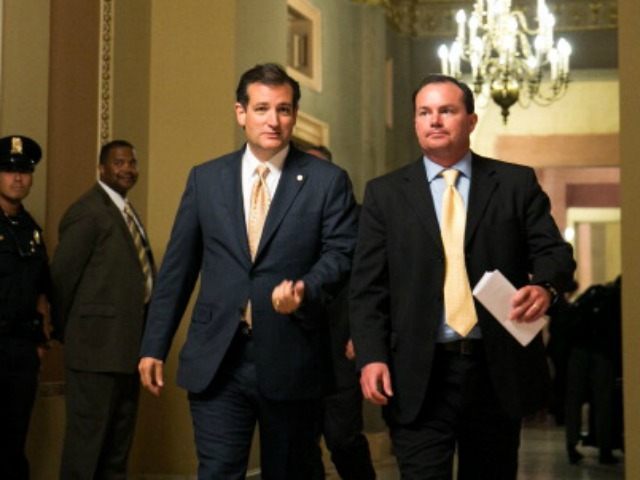Sens. Ted Cruz (R-TX) and Mike Lee (R-UT) spoke at a webinar hosted by the Heritage Foundation on Wednesday about what Congress’s next move should be in a post-coronavirus America. Both said any future legislation should be about recovery in the form of tax cuts and regulatory easing to help small businesses get back to work.
Small businesses in America account for 99.9 percent of businesses in the United States, with 500 or less employees, according to the U.S. Chamber of Commerce.
Cruz said he refers to the more than $2 trillion dollars the feds have doled out to help Americans and small businesses survive in the wake of the virus not as stimulus funding but as relief funding.
“They were designed to provide emergency relief — short term emergency, short-term emergency bridge loans for individuals and families and small businesses to help them get through the immediate crisis they were facing,” Cruz said.
Cruz said the amount of money Congress has spent “takes your breath away,” and he disagrees with Democrats who want to hand out more money.
“Where we are now, I believe the next legislation should be recovery legislation,” Cruz said. “It should be focused not on relief, not on spending more money and just shoveling more money at the problem,” Cruz said. “You can’t fix it that way.” He went on:
Instead, the next stage should be focused on tax reform and regulatory reform. In other words, lessening the burden on small businesses and job creators. The only way out of this mess, economically speaking, is to get people back to work, which means we need to be looking at policies that help the small businesses that are just starting to open up their doors again; that are just starting to see customers again.
We’ve got to unleash the engine of the American free enterprise system —the only thing strong enough to overcome this economic catastrophe.
Cruz said examining regulations is a good starting point:
One place to start is every regulation, state regulations, local regulations, that have been suspended because of the crisis, to deal with the crisis, I think we should all start with the presumption that those regulations should stay suspended going forward. That’s if it was deemed helpful for that regulation to be suspended during the time of crisis then it should still be helpful during recovery.
I really think that’s what our focus needs to be is how do we empower small businesses to drive free enterprise forward and turn our economy around and get people back to work.
Lee agreed with Cruz and added the value of limited government at a time like this.
“One of the many things he said that is right and appropriate for our time is that we’re not going to fix our economy with more government spending,” Lee said. “We’re not going to fix our economy with more government programs.”
“What we need is to get government out of the way so that Americans can start helping each other again,” Lee said.
Both lawmakers are working on legislation to address these concerns, including the Right to Test Act to give states authority to approve and distribute tests during a national health emergency and the Prime Act to gives states more authority in regulating meat processing plants instead of federal control, which during the coronavirus has led to bottlenecks in the food supply chain.
About this Lee said:
We have to remember that the federal government was never intended to be this all-encompassing regulatory body that would regulate even purely local activities like labor, mining, manufacturing, and agriculture. It certainly wasn’t meant to be the comprehensive exclusive regulator of things like meat packing, and yet it is the federal commandeering of the meat packing licensing and regulatory business in this nation that has resulted in bottle neck.
The Mercatus Center at George Mason University agrees with Cruz and Lee and wrote a proposal about some of the regulations that were lifted and should remain so, including the FDA approval process, Transportation Security Administration’s limits on hand sanitizers, tariffs on medical equipment imports, restrictions on telemedicine practices, restrictions on scope of practice for nurse practitioners, and state certificate-of-need laws, or certificate-of-need (CON) laws that require healthcare providers to first obtain permission before they can open or expand their facilities.
The proposal read, in part, “This list is not comprehensive; more suspended rules at the local, state, and federal levels are coming to our attention on a daily basis.This is not surprising, simply because so many rules have accumulated over the past 50 years. This regulatory accumulation has been well documented by the RegData Project, which, among other variables, measures the number of regulatory restrictions contained in US federal regulation. According to the project’s most recent dataset (RegData 3.2), the volume of federal regulations has increased by more than 150 percent in the past 50 years. In 1970, there were about 400,000 regulatory restrictions on the books. Today, there are more than 1,000,000 regulatory restrictions in effect.”
Follow Penny Starr on Twitter

COMMENTS
Please let us know if you're having issues with commenting.